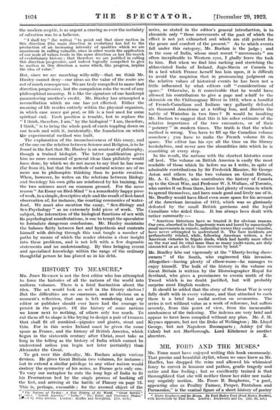HISTORY TO MEASURE.*
Ma. Jonx BUCHAN is not the first editor who has attempted to force the histories of all the nations of the world into uniform volumes. There is a fatal fascination about the idea. The set would look so well in the library shelves 1 But the difficulties are so enormous, and so obvious on a moment's reflection, that one is left wondering that any editor or publisher should ever have had the courage to persist in the project. Of the history of sonic nations we know next to nothing, of others only too much. To cut them all to shape is like trying to design a pair of trousers that shall fit all mankind—pigmies and giants, stout and thin. For in this series Ireland must be given the same space as France, and the history of British America, which began in the sixteenth century after Christ, must take as long in the telling as the history of India which cannot be understood unless you begin not later (certainly) than Alexander the Great.
To get over this difficulty, Mr. Buchan adopts various devices. He gives Great Britain two volumes, for instance ; but to extend a similar privilege to any other nation would destroy the symmetry of his series, so France gets only one. To vary our metaphor he cuts the long legs of India to fit his Procrustean bed by the single process of hacking off the feet, and arriving at the battle of Plassey on page 75. 'rids is, perhaps, excusable ; for the avowed object of the
• TAo Nations of To-day : a Pete History of Me World. " Great Britain" (2 " British America," " " The Baltic and Caucasian Balm" LiPited by John Buchan. London: Hodder and Stoughton, (15s. each.]
series, as stated in the editor's general introduction, is to chronicle only those movements of the past of which the effect is not yet exhausted and which are still potent for the peace and comfort of the present." As to which events fall under this category, Mr. Buchan is the judge ; and in the case of India, whose most recent " movements " are often inexplicable to Western eyes, I gladly leave the task to him. But when we find him racking and stretching the abbreviated limbs of Ireland, Jugo-Slavia or Canada to fit a bed which France herself has lain upon, it is difficult to avoid the suspicion that in pronouncing judgment on the relative values of historical events he has been not a little influenced by what editors call " considerations of space." Otherwise, is it conceivable that he would have allowed his contributors to give a page and a-half to the skirmish on the Chateauguay River in 1812, when a handful of French-Canadians and Indians very gallantly defeated six thousand Americans at a trifling loss, and dismiss the battle of Waterloo in two lines ? It would be insulting Mr. Buchan to suggest that this is his sober estimate of the relative importance of the two encounters, or of their " potency" in modern times. The truth is that the whole method is wrong. You have to fill up the Canadian volume somehow ; you have to make the French volume fit its space. The editor has his eye all the time on the library bookshelves, and never sees the absurdities into which he is stumbling at every step.
In the result, the nations with the shortest histories come off best. The volume on British America is easily the most readable of those which lie before me as I write, in spite of admirable contributions by Sir Frederick Maurice, Sir George Aston and others to the two volumes on Great Britain, Mr. A. G. Bradley, who contributes the history of Canada up to the Great War, and Professor W. S. Wallace, of Toronto, who carries it on from there, have had plenty of room in which to spread themselves, and have made good and lively use of it.
Mr. Bradley would have liked even more space for his account of the American invasion of 1812, which was so gloriously defeated by the small British garrisons and the loyal Canadians who aided them. It has always been dealt with rather summarily :- " American historians have so treated it for obvious reasons. Our own, absorbed in the Napoleonic wars and bored by numerically small movements in remote, unfamiliar scenes they cannot visualise, have never attempted to understand it. The bare incidents are perfunctorily related, while, following American writers, a few American victories in frigate duels, which had hardly more effect on the war and its vital issue than so many yacht-races, are duly chronicled as an offset to these reverses by land."
Mr. Bradley hits out vigorously at the " liberty-loving slave. owners " of the South, who engineered this invasion. Altogether—having plenty of elbow-room—he. manages to enjoy himself. The bulk of the history in the volume on Great Britain is written by the Historiographer Royal for Scotland, who gives a prominence to events north of the Tweed which is no doubt justified, but will probably surprise most English readers.
It should be added that the story of the Great War is very fully dealt with in every volume, and that attached to each there is a brief but useful section on economics. The series is not without value as a work of reference, but suffers severely, from this point of view, from the inexcusable carelessness of the indexing. The indexes arc very brief and appear to have been compiled without any plan. Mr. J. M. Keynes appears, but not the Duke of Wellington ; Mr. Lloyd George, but not Napoleon Buonaparte ; Ashley (of the Cabal) but not Marlborough. Lord Kitchener is another


































 Previous page
Previous page